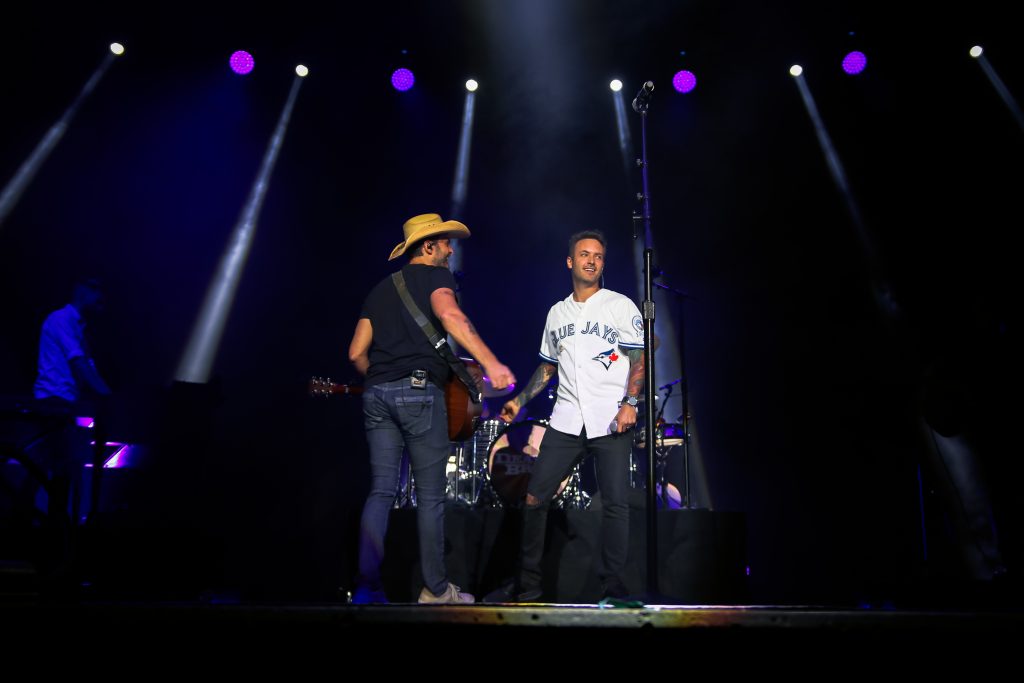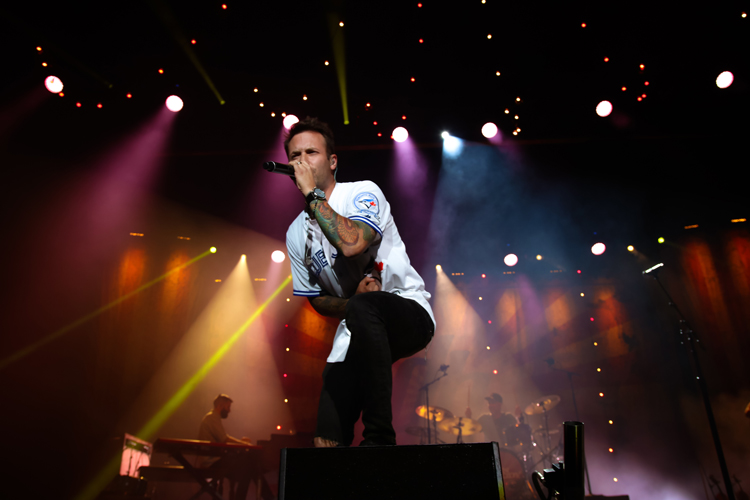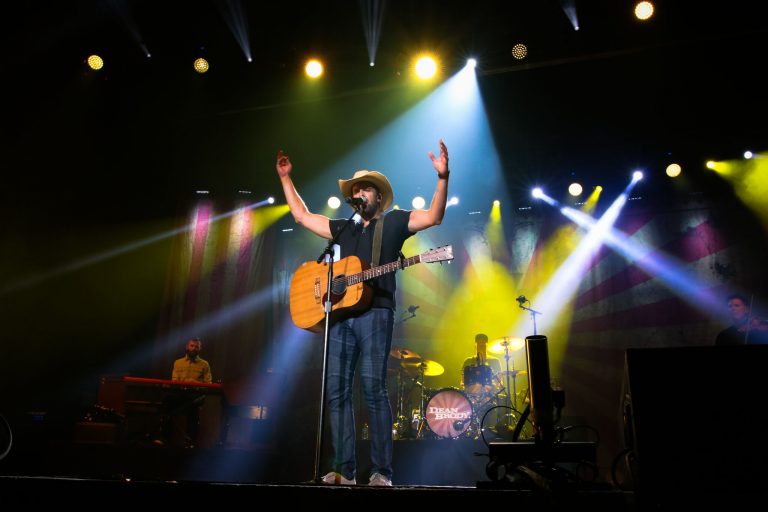On a recent tepid late August evening, Dean Brody began a new chapter in the history of Canadian country music. Promising a series of “surprise” guests, Brody along with openers Carly Pearce and Tim Hicks, took over Budweiser Stage in Toronto solely on the strength of domestic success, becoming one of the first Canadian acts in the genre to do so.
That evening, Brody played host to what could be described as the Canadian country version of Drake’s OVO-fest, with the headliner bringing out special guests Shevy Price and Madeline Merlo as well as the genre’s top names, including Dallas Smith and Alan Doyle to perform their own hits alongside Brody’s to the frenzied delight of the sold out crowd.
 Dean Brody and special guest Dallas Smith at Budweiser Stage, Toronto, Ontario August 24, 2017. Photo by: Pedro Rosa
Dean Brody and special guest Dallas Smith at Budweiser Stage, Toronto, Ontario August 24, 2017. Photo by: Pedro Rosa
Like Drake, Brody has spent his recent years spearheading a maple-tinged musical revolution. Bucking the downwards trend of the music industry, both men found record-breaking success by eschewing their genre’s stereotypes — re-framing the narrative through personal lyrics which highlight their Canadian roots. But while Drake is hailed by the mainstream media as a revolutionary, few outside country music fandom have noted his country-counterpart’s own venerable achievement.
As the head of Canada’s leading independent country music label and management company, RGK Entertainment Group founder Ron Kitchener has spent the last decade plus pondering that discrepancy. “This is something we’ve been fighting for years,” he says. Speaking on the afternoon of Brody’s Budweiser Stage show, Kitchener is in the eye of the hurricane, fielding a flurry of calls, well-wishes and requests as show time nears. “There’s a couple things at play,” he explains. “The fact is, until now if [the media] is going to cover country artists, it’s the ones out of Nashville or those Canadian artists that get contracts out of Nashville. And maybe there’s a perception that the Canadian scene hasn’t been on par but now you can see in terms of ticket sales, consumption and radio success, we now have a growing domestic star system. You have artists like Dean Brody, Dallas Smith and Tim Hicks who can make a living on Canadian success alone. To me, that’s the benchmark where national coverage should start.”
Kitchener’s hope is domestic country music crests to the point where it’s no longer possible for national media to dismiss it. And he has good reason to be optimistic. According to a 2016 study of the Canadian music industry conducted by BuzzAngle, Canadians consumed 23.6% more country albums in 2016 than in the previous year, a genre growth rate second only to Children’s music (23.9%) and way above pop (-5%), rock (-0.5%) and hip hop (6.6%). Likewise, in a 2016 study on music consumption habits conducted by the Canadian Country Music Association, 20% of Canadians rank country music as their genre of choice — narrowly beating out pop (19%), rock (18%) and R&B (5). As Kitchener points out, though it’s yet to hit the sales figures of pop or rock, while those genres have either stagnated or dipped in recent years, country music has not only maintained its core fan-base of 30-plus rural demographic, but, by diversifying its influences and incorporating pop, rap, psychedelic and indie-rock into the mix, “what you’ve done is added 15-29 in a big way. I think all the other genres have to be aware that this is [now] wide and diverse.”
 Dean Brody performing at Budweiser Stage, Toronto, Ontario August 24, 2017. Photo by: Pedro Rosa
Dean Brody performing at Budweiser Stage, Toronto, Ontario August 24, 2017. Photo by: Pedro Rosa
Yet, despite this undeniable current swell, few national outlets are reflecting that demand. Both the National Post and the Globe and Mail have largely ignored the genre, and if there has been coverage, it’s almost always of an American artist. According to CBC Music executive producer Brad Frenette, country’s clean cut image has led click-hungry editors to be weary of giving it space. “Country music isn’t high culture, and it doesn’t hold the social and political urgency and importance of hip-hop,” Frenette, a lifelong country music fan who worked at the National Post and the Guardian before coming to the CBC, explains. “Most of the country acts I’ve met are friendly and on script – talking about their team, their fans, and their families. That doesn’t make for an easy pitch for the A-section of the newspaper.”
Dean Brody points to another lingering stigma, “music’s lingering and archaic stereotype – one that’s taken years to re-mold.”
“I’m talking the whole yee haw, howdy doody, tear in my beer, lost my dog, Boom-Chucka-boom bass lines and neck-tie-cowboys-singing around studio campfires-kind of outdated stereotypes,” he posits. But, “I’m a little confused as to why some in the media are as uneducated about the new country world as they are,” he adds. “because our genre has been a hugely successful format with perhaps the most diverse demographic in the business.”
 Special guest Dallas Smith with Dean Brody at Budweiser Stage, Toronto, Ontario August 24, 2017. Photo by: Pedro Rosa
Special guest Dallas Smith with Dean Brody at Budweiser Stage, Toronto, Ontario August 24, 2017. Photo by: Pedro Rosa
Perhaps no Canadian artist personifies this musical taste evolution as well as Dallas Smith. As the former singer for chart topping rock band Default, Smith witnessed the post-Nickelback national rock boom first hand. But when his band called it quits, Smith discovered that country had evolved into a genre that aligned better than rock to his own tastes.
“As country music was evolving into the more guitar driven [sound], it really became a perfect blend of what I listened to growing up,” Smiths says over the phone. “Growing up I listened to everything from The Beatles to Zeppelin, southern rock stuff to my mom playing a lot of female country music, Reba and The Judds. When Keith Urban came out and it was a bit of all of that, it evolved into something I could be a part of. ”
Smith says the domestic country industry has exploded so fast, it reminds him of his early Default days when Canadian acts seamlessly integrated with their American counterparts. As an example, he points to the success of festivals like Boots and Hearts, “it’s like the rock festivals [with Default]. I’m seeing those same kids, just the next generation.” The difference is, unlike the rock days, “you would never know that’s going on unless you’re on site.”
As a result of that lack of coverage, Smith says the CCMA Awards have become the only national showcase most of the domestic stars have. “Artists here just don’t have that opportunity [anywhere else]. It’s about making use of the three minutes you have on that stage,” he laments.
Like Smith, Brody believes Canada is ready to embrace country music on a mainstream, national scale. “Canadian country is our music, our story, our voice. We can sing about Canadian things and our audience gets it. I love that.”
– Jon Dekel


